February 27 Soroa
 |
| Jardin Botanico Orquideario Soroa sign |
The next morning we walked next door to a very
interesting and beautiful orchid garden run by the University of Pinar del Rio, the Jardín Botánico Orquideario Soroa.
 |
| Orchid Garden in Soroa, Cuba |
 |
| Orchids at Jardin Botanico Orquideario Soroa, Cuba |
To keep him happy for the rest of this blog, here are a
few of his favorite orchid shots:
 |
| Orchid at the Soroa Orchid Garden |
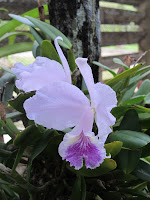 |
| Orchid at the Soroa Orchid Garden |
This garden is posed in pretty rugged terrain with a lot
of interesting rock formations. We
walked up hill to the garden house and offices, and had a great view of the
Pinar del Rio landscape.
 |
| Orchid Garden-Jardin Botanico Orquideario Soroa, Cuba |
 |
| Amusing photo from the Orchid Garden |
In an attempt at equality, Joan took a great picture at the Orchid Garden too. It was totally accidental, as she curved her arm around a tree to take the shot, and only afterwards saw what an amusing picture she had taken. You be the judge:
There was a whole row of great old cars parked at the
Orchid Garden-taxis that had brought visitors to the garden, which reminds us
that we would be remiss if we didn’t mention Cuba
 |
| 1955 Pontiacs, a Cadillac and one white Thunderbird! Taxis, Cuban-style. |
Yes, there are a lot of vintage cars in Cuba, many are
taxis. They are abundant for two
reasons. First, out of necessity.
Though the Russians brought in a lot of their boxy Ladas during the years they propped up Cuba, and later the Japanese have
brought in many cars, most people didn’t have the money to buy a new car; they
had to make do with what they had – a bunch of old Detroit models.
 |
| Vintage car in Habana, Cuba |
The second reason has to do with the
ingenuity of the Cuban mechanics. A
friend of ours was talking to the proud owner of an old Cadillac, and asked him
how he finds engine parts. The answer
was quick, “oh, there’s been a Toyota Miami
that has a specialty trade, and probably some of the stuff we saw under those
poly-wrapped bundles we saw at the Miami
 |
| Another wonderful, colorful vintage car in Cuba |
So if you know someone that is trying to
dispose of a ‘50s Chevy, tell them to ship it to Miami
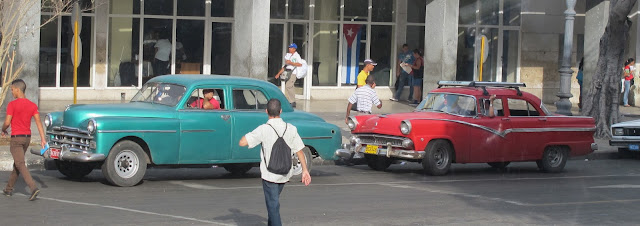 |
| Some of the wonderful, colorful old cars we saw in Cuba |
 |
| Charming old car, and not painted a shade of blue! |
 |
| Another wonderful, colorful vintage car in Cuba |
 |
| Another wonderful, colorful vintage car in Cuba |
 |
| Alternative, and often-used transportation in Cuba, especially in the countryside |
 |
| Lots of starches! Fried pork and potatoes and "Moors & Christians" |
That afternoon our group, which included a number of avid birders, went on a special nature walk, but we lack the knowledge of birds, and not wanting to drag the group down, opted to stay at the hotel to read, do laundry and see about a nap. (They go well after lunches). Besides, Joan was reading a really interesting book by Yoani Sanchez, the Generation Y dissident Cuban blogger, and she wanted to finish it. For an interesting view of Cuba, read Havana Real: One Woman Fights to Tell the Truth about Cuba Today.
After another refreshing swim in the
pool, that evening we had the same simple but adequate buffet at the hotel. Lots more white food!
 |
| Pina Colada with Cuban Rum-Yum |
We enjoyed the evening by sitting around the pool drinking rum in various forms and smoking cigars. (Well, some of us smoked cigars.) (Some of us drank pina coladas!)
Thursday, March 28
The day dawned in the glade of Soroa with the birds singing and the sun trying to come out.
We checked out of the Soroa hotel and boarded the bus for a region
called Mil Cumbres (Thousand Peaks), an ecologically protected area and home of one of the highest concentrations of native Cuban species.
We met Raphael Carbonel, a field station staffer, who led us through a village,
onto trails, over streams, checking out the flora and fauna en route,
discussing the very wide variety of species they have in this region, which is
protected to some degree. It was alternately misting, raining and drizzling-perfect day for a walk!
Along the way we passed by some simple rural
farms. Modest would be polite, very poor
might be more accurate, but charming nevertheless. Many of the village houses had outdoor
kitchens, sometime covered just with a simple shelter for rainy weather—probably
an ideal kitchen in their usually hot, steamy climate!
 |
| Raphael ready to help Dane across a rocky stream bed |
 |
| The start of our hike through in Mil Cumbres through a village |
 |
| A rural kitchen in Cuba |
It was raining off and on, mostly on, for most of the walk, so stopping
at one farm to rest under a covered porch was welcome. Even more welcome was the large assortment of
fresh local fruit the farmer had prepared for us. They offered us platters full of slices of star
fruit, grapefruit, pineapple, and the freshest bananas – the best we’ve ever
had. Plus delicious coffee! This simple repast took our minds
off our soggy shoes and shirts. The farmer answered our questions and told us that his family grows almost everything they need except soap, salt, flour and similar basics.
On our walk we saw rice, bananas, pineapples, poultry, pigs, goats and even a woodworking shop.
On our walk we saw rice, bananas, pineapples, poultry, pigs, goats and even a woodworking shop.
We got back to the bus and drove a few miles to an entirely different
ecosystem, and our guide took us on a short but rough hike up an old fire trail
to see some different rock formations and plants. The rain had let up, but the weather was
still not what the photographer ordered.
Back at the field station, an old planter's mansion, we had a fine but simple lunch of bean soup, rice and ropa
vieja. A word about ropa vieja: those of you who know Spanish might be asking
why we were eating “old clothes.” This
is the good- natured nickname for a shredded flank, brisket or skirt steak in a
tomato sauce, which was for us a popular variation to the three famous choices
of chicken, fish or pork. An interesting side dish was what the Cubans call yucca, also known as Cassava or manioc. Starchy, tasted sort of like potatoes.
We drove on to our hotel for the next two nights, Hotel Rancho San
Vincente, right in the midst of the scenic Sierra de Vinales, nestled in a leafy
grove. We all had individual cabins
scattered over the hillside, each with a wide covered porch, perfect for
sitting and enjoying the misty, rainy weather without getting wet. We're sorry that it rained for two days straight mostly because we didn't take a picture of the sylvan glade and our cabins.
That evening we ate at Paladar La Terraza, a private restaurant out in a former house. We sat in a
large porch area added in the back yard.
 |
| Paladar La Terraza private restaurant |
Here the famous threesome was grilled over an open fire which we passed as we entered. They also, excitedly, offered us
lobster as an (extra charge) option, but we discovered it is a different species
in the Caribbean, a spiny lobster, and we think they must "butcher" it with a cleaver,
which makes for interesting eating, and don’t ask for clarified butter. We tried it – once. We were discussing how one doesn’t always see
a lot of dairy products is warmer climes, and we noticed that in Cuba, butter
tasted different, and portions were non-existent or skimpy; we don’t know if the issue is climatic or economic, or
both. The meal was welcome and fine, and
the pina coladas were great.

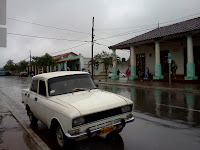
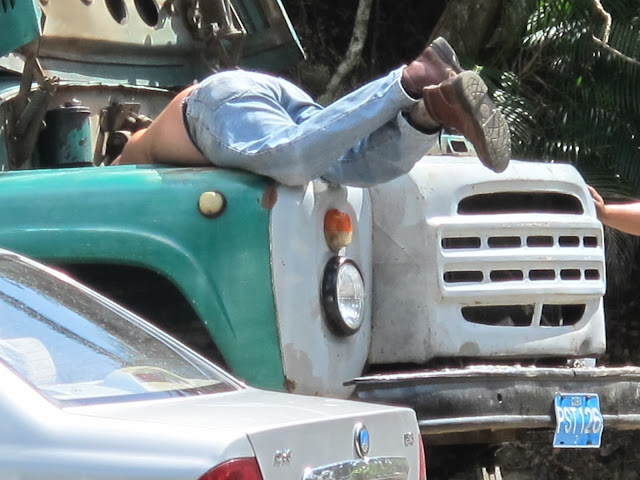
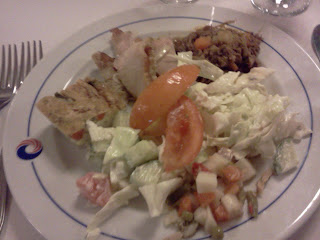




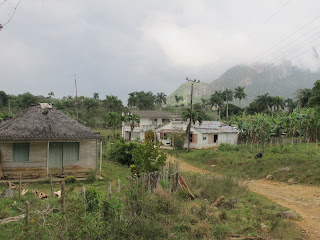
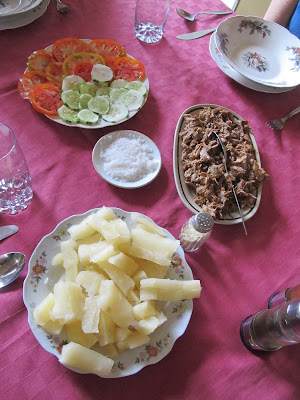

Wonderfully evocative, Joan and Dane! I am so glad you got the mechanic's photo. As to yucca- I think it is bland to the point of having negative taste. We had some great rice puddings, to redeem the white food category.
ReplyDeleteWe're glad you're enjoying reliving the trip, Margie! Salt and pepper helped the yucca somewhat, but it sure could have used a big blob of butter. And I always thought it wasn't a real rice pudding without raisins! Joan
Delete